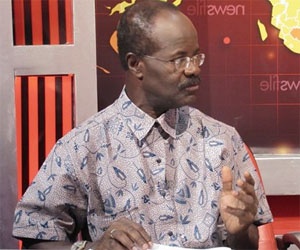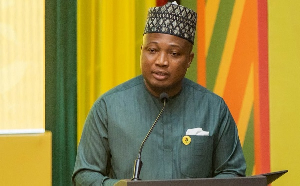President and Chief Executive Officer (CEO) of Groupe Nduom (GN), Dr. Papa Kwesi Nduom, has underscored the need for the successor of the outgoing Chairman of the Electoral Commission (EC), Dr. Kwadwo Afari-Gyan, to be non-partisan.
Dr. Nduom was of the view that since the political stability of the country rests on the shoulders of the EC boss and per the 1992 Constitution has the sole right to determine which political party forms the next government after every four years of general elections; it is imperative that such a person is non-partisan.
Nevertheless, he intimated that the 1992 Constitution which determines how the country should be governed including the appointment of the EC chair and the six other commissioners should not be brushed aside.
Dr. Nduom was discussing the relevance of the position of the EC chairman with viewers and listeners on Ghana, Great and Strong, a non-partisan programme broadcast every Saturday from 7:00 P.M.,-8:00 P.M., on Ghana’s foremost internet-based radio, www.hedjorleonlineradio.com.
Last Saturday’s programme was carried live on Amansan TV (ATV) in Accra and other affiliate radio stations including Ahomka FM, Enyidado FM, Agoro FM etc.
Building his argument the GN president quoted Chapter 7 of the 1992 Constitution which talks about the representation of the people and how the EC chairman and the six other commissioners should be appointed and their functions.
According to Dr. Nduom, the functions of the EC chair which includes the compilation and revision of the voters register at periods that may be determined by law; demarcation of electoral boundaries for both national and local government elections and conducting and supervising all public elections and referenda, made the position very crucial.
To this end, he affirmed that it was important for President John Dramani Mahama to ensure that the choice for a replacement of Dr. Afari-Gyan passes the test of credibility.
“The process of choosing the EC’s successor must not be compromised in any way as largely the stability of this country hinges on who heads the EC,” Dr. Nduom stressed.
Though he agreed with the constitution that the appointment of the EC should be done in consultation with the Council of State, he further stressed that such a person must have an “impeccable character.”
Significantly, majority of the people who called into the programme together with text messages that were sere sent all supported the call by Dr. Nduom to have an unbiased EC chairman to succeed Dr. Afari-Gyan who retires in June this year.
He advised that any future EC boss must make sure that well educated people are engaged as returning and presiding officers for every election in the country.
Citing Nigeria as an example, Dr. Nduom explained that their recent successful polls was as a result of the fact that the Nigeria EC employed competent and educated people in conducting the elections.
“If we can have trusted and competent people to work at the EC, automatically there will always be peace after every election,” Dr. Nduom indicated.
He also touched on the need for the Political Parties Law (PPL) to be enforced whilst juxtaposing it with the appointment of the EC chairman.
He quoted a portion of the PPL which states that no political party should be formed on ethnic or gender or regional lines.
That, he said, must be the responsibility of the incoming EC boss to ensure that that law is adhered to.
In the opinion of Dr. Nduom, the polarisation of the country was as a result of the way political parties in Ghana were formed.
He wondered why the previous EC chairmen could not ensure that political parties did not receive funding from any foreign entity or non-Ghanaian.
According to him, the PPL states clearly that non-citizens should not directly or indirectly contribute towards the development of any political party.
Along this line he said it was therefore unlawful for any political party in Ghana to accept any offer(s) either in cash or kind from non-citizens or a foreign company.
Dr. Nduom could also not understand why on paper there were about 200 registered political parties but few including the PPP, physically existed.
He thus charged the yet-to-be appointed EC chairman to put his or her feet down to make the PPL work.
General News of Wednesday, 29 April 2015
Source: Today Newspaper













